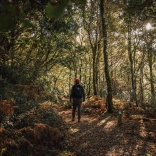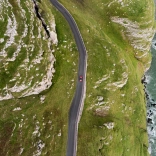For millennia, people all around the world have gazed up, wide-eyed, towards the heavens, trying to make sense of the universe and our place within it.
But, with worldwide population growth and the expansion of industrial cities, a 2016 study found that 80 percent of the world – and more than 99 percent of the US and European populations – live under skies polluted by artificial light, impairing their views of the stars above them.
Fortunately, the glorious, unblemished Welsh countryside has helped Wales avoid the worst effects of wide-scale light pollution, and organisations – on both a local and international scale – have worked hard to ensure our dark skies are safeguarded for current and future generations to enjoy.
The result is that Wales is now one of the world’s great destinations for stargazing, attracting both adept and amateur astronomers alike, keen to behold the night sky in all its glory. Here’s an overview of the stargazing scene in Wales, with details of how the country’s dark skies are being protected and where visitors can go to peer up at the planets.
International Dark Sky Places
International Dark Sky Places
The International Dark Sky Places (IDSP) initiative was founded by leading anti-light pollution body the International Dark Sky Association in 2001 to encourage communities to preserve and protect the world’s dark places through education and alternative lighting means. The association believes minimising light pollution is not only essential for the health of nocturnal wildlife, but also human wellbeing as well.
Wales has three IDSPs within its borders – including two of only 18 ‘International Dark Sky Reserves’ (the geographically largest categorisation of IDSP) worldwide.
Brecon Beacons National Park
Bannau Brycheiniog (Brecon Beacons) National Park was the first area to be given International Dark Sky Reserve status in Wales (and only the fifth in the world!) in 2013. The park stretches around 40 miles (64 km) from Abergavenny to Llandeilo across the eastern half of South Wales.
Despite the park’s southern borders being less than an hour by car from the country’s two largest cities, Cardiff and Swansea, on a clear night connoisseurs of the cosmos can spy the Milky Way, major constellations, and – if timed well – even meteor showers.
Eryri (Snowdonia) National Park
Eryri (Snowdonia) National Park was granted International Dark Sky Reserve status in 2015. Much of the park’s terrain (which covers around ten percent of the total land area of Wales!) is rugged and mountainous, and largely uninhabited. As a result of this, the International Dark Sky Association considers Eryri one of the darkest places remaining in southern Britain.
Every local astronomer has a favoured spot to survey the Eryri sky, be it lakeside locations at Llyn y Dywarchen and Llyn Geirionnydd or the Bwlch y Groes mountain pass, but, on a clear night, visitors are guaranteed a sky sprinkled with stars from almost any vantage point inside the park’s boundaries.
Elan Valley Estate
Elan Valley Estate is the only designated Dark Sky Park (a smaller version of a Dark Sky Reserve) in Wales. Located roughly midway between the Eryri (Snowdonia) and Bannau Brycheiniog (Brecon Beacons) Reserves, the park spans all of the 70 square mile Elan Estate, which is owned by Dŵr Cymru Welsh Water, and home to a number of large reservoirs.
The estate has long worked to protect wildlife in the area (with parts designated as special areas of conservation and scientific interest), but more recently has worked to preserve the area’s star-lit evening skies, taking precautions such as adapting street lamps to ensure minimal light pollution. As a result, the area now serves as a vast pocket of beautiful stargazing territory right in the middle of Wales.

Dark Sky Discovery Sites
Separate to the International Dark Sky Association, the Dark Sky Discovery Partnership is a UK-based network of national and local astronomy and environmental organisations that has its own listing of favoured stargazing areas, known as Dark Sky Discovery Sites.
Wales has more than 30 of these sites scattered across the country, with top-ranked spots including Newgale Beach in Pembrokeshire, the National Botanic Garden of Wales in Carmarthenshire, and the village of Llangaffo on the isle of Anglesey.
How to enjoy the night sky in Wales
On a cloudless evening, visitors heading to designated dark sky spots in Wales will need little more than warm clothing and a bit of patience to spy everything from distant planets to shooting stars.
Those who’d prefer a touch of expert guidance, however, can partake in a dedicated star gazing tour, such as the ones run by Dark Sky Telescope Hire in Bannau Brycheiniog (Brecon Beacons), or stop by a local astronomy club’s viewing night, such as the monthly meet up of the North Wales Astronomy Society at Colwyn Bay. The use of telescopes and charts provide star-seekers with an opportunity to delve even deeper into the magic of the Welsh night sky.
Bannau Brycheiniog, Eryri and the Elan Valley Estate also all have accommodation inside the park catering to tourists who want to spend long nights gazing upwards. All three parks also boast some excellent campsites (Dark Skies Camping in Brecon to name just one), where guests can peek out from under canvas for a top-class celestial show.




